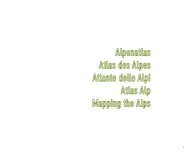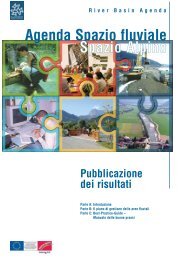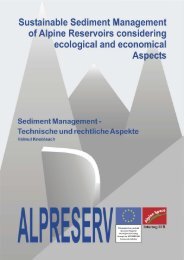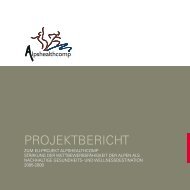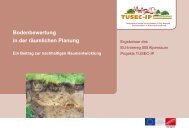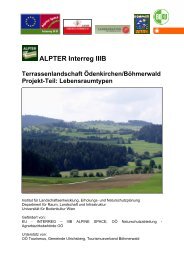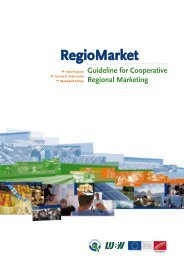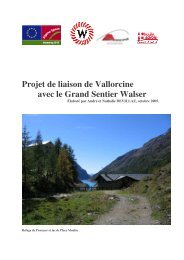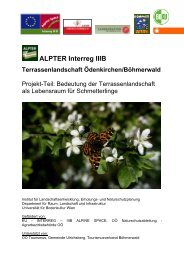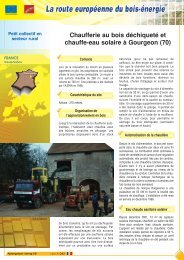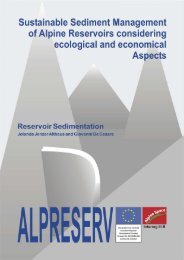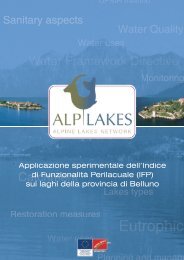WALSERSPRACHE - The four main objectives of the Alpine Space ...
WALSERSPRACHE - The four main objectives of the Alpine Space ...
WALSERSPRACHE - The four main objectives of the Alpine Space ...
Create successful ePaper yourself
Turn your PDF publications into a flip-book with our unique Google optimized e-Paper software.
Sergio Maria Gilardino<br />
= ergremmung, erbeisung<br />
Il va sans dire qu’il s’agit d’une série de comparaisons et de recherches<br />
qui demandent le dévouement et l’appui des jeunes chercheurs.<br />
C’est bien pour cela que nous pr<strong>of</strong>itons de la présence de plusieurs dictionnaristes<br />
et savants de la langue des Walsers, comme Peter Zürrer, Max<br />
Waibel, Kurt Wanner, Volmar Schmid et Elisabetta Fazzini, en cette assemblée,<br />
pour les conjurer de bien vouloir continuer à nous <strong>four</strong>nir autant le<br />
savoir-faire scientifique qui s’impose en de telles prises de Bastille, que<br />
les disciples et les étudiants en phase de rédaction de thèse qui pourraient<br />
suivre par segments ce dessein ambitieux, et néanmoins très faisable,<br />
de donner enfin aux Walsers une langue unifiée.<br />
<strong>The</strong>re is no such thing as a Walser language. It never reached <strong>the</strong> status <strong>of</strong> a state language<br />
nor did it ever serve as a literary tool <strong>of</strong> great prestige. <strong>The</strong> Walsers simply spoke<br />
<strong>the</strong>ir respective dialects, virtually unaware <strong>of</strong> one ano<strong>the</strong>r’s whereabouts and ultimate<br />
lot. <strong>The</strong> need for a concerted action was felt, but still nowadays we fall short <strong>of</strong> even a<br />
sketchy outline <strong>of</strong> a Walser language. Isolation is probably <strong>the</strong> <strong>main</strong> cause <strong>of</strong> this much<br />
felt shortcoming. Yet it should not be too difficult to devise a common grammar and dictionary.<br />
After all, <strong>the</strong>y drew <strong>the</strong> grammatical and word outline <strong>of</strong> ancient German,<br />
Angle-Saxon and even Indo-European, so it should not be too hard to do <strong>the</strong> same for <strong>the</strong><br />
language <strong>of</strong> <strong>the</strong> Walsers. En route toward such an ambitious goal, let us not confuse<br />
ancestral and state languages. All dialects were at some time past a language. <strong>The</strong>y were<br />
demoted because a state language took over. Should this be taken to mean dialects can<br />
no longer express all embracing human feelings? Absolutely not. People at large believe<br />
languages are only those so consacrated by constitutions and state laws, and literary critics<br />
<strong>of</strong>ten take <strong>the</strong>ir task to be that <strong>of</strong> deciding what a language and what a dialect is. Such<br />
a task falls to <strong>the</strong> linguist. All <strong>the</strong> literary critic has to do is to determine whe<strong>the</strong>r <strong>the</strong> linguistic<br />
medium used in a literary composition was apt to convey <strong>the</strong> poetical meaning it<br />
was meant to. If critics confined <strong>the</strong>mselves to that task, <strong>the</strong>y would find out more <strong>of</strong>ten<br />
than not primitive languages and dialects accomplish that far better than <strong>of</strong>ficial languages.<br />
If that is true for poets and poetry, it is even more so for peoples and civilisations.<br />
Languages are not such because constitutions hallow <strong>the</strong>m, but because peoples cling to<br />
***<br />
151



